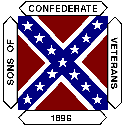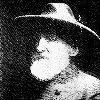
|
SCV - Col. Robert G. Shaver Camp 1655
Colonel Robert Glenn Shaver



|


Excerpted from the Confederate Veteran, Volume XXIII, pages 178-179:
Colonel Robert G. Shaver died at the home of his daughter, Mrs. P.B. Williams,
at Foreman, Arkansas, on January 13,1915, aged eighty-four years. He came to Arkansas
with his parents from Sullivan County, East Tennessee, in 1850, locating at Batesville,
where in 1856 he was married to Miss Adelaide Louise Ringgold, a beautiful and accomplished
daughter of Col. John Ringgold, one of the State's mose prominent citizens. Some three
years later he removed to Lawrence County, where he was licensed to practice law.
In the spring of 1861 he recruited and organized the 7th Arkansas Infantry for the Confederate army and was elected its first colonel. He and his regiment saw service at Columbus and Bowling Green, Ky., and on the evacuation of the latter place by General Albert Sidney Johnston in February, 1862, Colonel Shaver, as senior Colonel of the brigade in which his regiment was serving, commanded the rear guard of General Johnston's army to Nashville, Tenn., a most critical period.
At Shiloh, April 6 and 7, 1862, Colonel Shaver, still in command of the brigade - i.e., the 1st Brigade of Hindman's Division, 3d Army Corps, composed of the 2nd, 6th, and 7th Arkansas Infantry and the 3d Confederate Infantry, two-thirds of the latter regiment also being Arkansans - rose level to his country's need, and the soldiers who followed him were of the very best type. Colonel Shaver initiated the fight on the Confederate right early Sunday morning, the 6th, where the fighting was fierce and incessant throughout that bloody struggle, a struggle in which brothers were standard bearers of the opposing forces, and where he led there was much carnage; yet victory was his at every point, as his troops surged forward in conjunction with his alignment of the Confederate center and left wing, pushing the Federals back toward the Tennessee River; where late in the afternoon they appeared a conglomerated mass of fugitives on the river bank seeking the friendly aegis of the Federal gunboats.
The 7th Arkansas, Colonel Shaver's own regiment, went into action on the left of the brigade, Lieutenant Colonel Deane commanding, with its drum-and-fife corps playing "Granny, Will Your Dog Bite?"
Colonel Shaver had two horses killed under him during the day and one on the following day, when he and his brigade continued to fight gallantly and effectively. General Hardee, in his report of the battle, said that Colonel Shaver's conduct was most satisfactory, skillful, and exemplary throughout both days' fighting.
Early in June, 1862, Colonel Shaver, with General Hindman, was transferred to the Trans-Mississippi Department; and at Jacksonport, Ark., on the 8th of September of that year, Colonel Shaver organized the 38th Arkansas Infantry, of which he was unanimously elected colonel and which he continued to command during the various campaigns and battles in that department. In the fall of 1864, at the reorganization of the Army of the Trans-Mississippi, Colonel Shaver was again elected colonel of the 38th, and on the same day, in a different field, he was also elected colonel of Shaver's 27th Arkansas Infantry. Gen. Kirby Smith consolidated these two regiments, and they were known thenceforth until the surrender in June, 1865, as Shaver's Infantry Regiment. He participated in all the principal battles fought in the Trans-Mississippi Department after June, 1862, among which were Prairie Grove, Mansfield, Jenkins' Ferry, Poison Springs, Marks Mill, and all the battles incident to Gen. Dick Taylor's Red River campaign against General Banks, during all of which he displayed his usual gallantry and resourcefulness. That Colonel Shaver was not killed was not his fault, for he gave the Federals every opportunity on many fields.
At the evacuation of Little Rock, September 10, 1863, Colonel Shaver was in command of his brigade and covered the Confederate retreat out of the city southward. He was greatly chagrined and deeply mortified that he was not permitted to engage the enemy, and he always contended that General Price should have offered battle; that his forces were numerically superior to the Federals under General Steele and were in fine trim and anxious to fight. It has been truthfully said of Colonel Shaver that he had rather fight than eat, even after a week's subsistence on half rations and those who knew him and saw him on different battle fields can well testify to his worth as a resourceful officer and a tenacious fighter. He was a soldier by intuition, adaptability, and desire, and withal a strategist and tactician, a warrior with but few peers. He is mentioned in twelve different volumes and on many pages of the "Records" of the Union and Confederate armies, made up of the reports of the various commanding generals and published after the war by the government.
Colonel Shaver not only had no friends at court, but much strong opposition caused by a political fight engendered in a State campaign in 1860. One of the defeated candidates for State honors, being in high authority at Richmond in the Confederate Senate, always opposed Colonel Shaver's promotion; otherwise he would certainly have attained at least the rank of major general. With that rank opportunities would have offered which he would have availed effectively, thereby placing him beyond the reach of the deadly enmity of the politician; for as a military genius he was Gen. Pat Cleburne's equal in every respect, and everybody knows there was none better than Cleburne.
Colonel Shaver's well-earned sobriquet of "Fighting Bob Shaver" was known throughout the different armies in which he served. He was wounded four times and had six horses killed under him in action.
A poem on the Arkansas Confederate soldier mentions Colonel Shaver in one of its stanzas, as follows:

This web page authored by Mark Gerdes.
Last updated May 1, 1996.
Page and all contents Copyrightę 1996 by SCV Camp #1655,
Jonesboro, Arkansas.